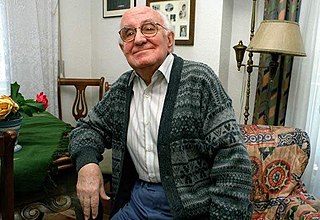Related Research Articles
Jaime Fernández Reyes was a Mexican actor. Over his career, he won 3 Silver Ariel awards — the Mexican equivalent of the Oscar — including one for what is arguably his best-known role, playing Friday, the protagonist's associate in Luis Buñuel's Robinson Crusoe. He appeared in over 200 films and served as the general secretary of the National Association of Actors (ANDA) for 11 years. His father was actor/director Emilio Fernández.

Su Excelencia is a 1967 Mexican political satire film directed by Miguel M. Delgado and starring Cantinflas and Sonia Infante. The film is set in a parody universe where "Red" and "Green" countries are the political equivalents of the socialist and capitalist countries of the Cold War, which the film satirizes. Cantinflas portrays Lupitos, a chancellor stationed in his country's embassy in the communist country of Pepeslavia who later ascends to the role of ambassador and has to decide the pivotal vote of joining the "Reds" or the "Greens", therefore deciding the fate of the entire world.

Ángel Álvarez was a prolific Spanish film actor.
Víctor Israel born José María Soler Vilanova was a Spanish film actor. He appeared in more than 140 films, beginning in 1961. He died on 19 September 2009 aged 80 in Barcelona.
José María Caffarel Fábregas was a Spanish film actor. He appeared in more than 170 films between 1957 and 1998. He was born in Barcelona and died in Madrid, Spain.
Alejandro Ciangherotti was a Mexican film actor. He appeared in 45 films between 1953 and 1999.

Luis Barbero Fernández was a Spanish actor. He appeared in more than 150 films and television shows between 1957 and 2001. In 2000, he was awarded with a Lifetime Achievement Award from the Spanish Actors Union. He died of a heart attack in 2005.

Comedy in the Golden Age of Mexican Cinema is a Mexican era of film popular during "El Porfiriato" which represents the reign of Porfirio Díaz as dictator in Mexico.

Adventure in the Night is a 1948 Mexican mystery film directed by Rolando Aguilar and starring Luis Aguilar, Miroslava and Susana Cora. The film's sets were designed by the art director José Rodríguez Granada. The plot focusses on two friends, a screenwriter and a film director, who pick up two young women on the road and offer then a lift. They later discover that the women had supposedly died two months earlier.
The Magician is a 1949 Mexican comedy film directed by Miguel M. Delgado and starring Cantinflas, Leonora Amar and José Baviera. The film tells the story of lookalike hired from an agency to take the place of a magician who has gone on holiday.

If I Were a Congressman is a 1952 Mexican comedy film directed by Miguel M. Delgado and starring Cantinflas, Gloria Mange and Andrés Soler.
The Photographer or Mr. Photographer is a 1953 Mexican comedy thriller film directed by Miguel M. Delgado and starring Cantinflas, Rosita Arenas and Ángel Garasa.

Manuel Dondé was a Mexican film actor. He frequently played villains during his long film career.

José Riesgo was a Spanish actor. After fighting in the Spanish Civil War for the Spanish Republican Army, he began acting in 1943. He played Julián in Barrio Sésamo, where he got a success and he performed the same character on plays until his retirement. He died on 16 May 2002.
Tomás Ares Pena, known as Xan das Bolas was a Spanish comic actor active during the franquism with films including Botón de ancla (1961).
Gran Hotel is a 1944 Mexican film directed and written by Miguel M. Delgado, starring Cantinflas.
Conchita Gentil Arcos was a Mexican actress of the Golden Age of Mexican cinema as a character actress in supporting roles.
Cuatro contra el mundo is a 1950 Mexican film noir crime drama film directed by Alejandro Galindo, who also wrote the screenplay alongside Gunther Gerzso, and starring Víctor Parra and Leticia Palma, about a gang that raids a van that carries money. The film is considered as a prototype for Mexican film noir.
Drop the Curtain is a 1955 Mexican comedy film directed by Miguel M. Delgado and starring Cantinflas, Christiane Martel and Beatriz Saavedra. The film's art direction was by Gunther Gerszo.
Emilio Rodríguez was a Spanish actor. During the Spanish post-war, he worked as a police man and he was a volunteer at División Azul. Between 1950 and 1960 he was a supporting actor. He played Inspector Ballestero in Deadfall (1968), starring Michael Caine, and Warden in Kid Rodelo (1966) At the age of 50 he retired for health problems, and then he starred in Crónicas de un pueblo, in the role of the teacher D. Antonio. After the death of Francisco Franco he was categorized as a francoist character. He finally appeared in Verano azul, and died in 1983.
References
- 1 2 Neufeld, Matthews & Beezley 2015 , p. 283
- 1 2 García Berumen 2016 , p. 57
- 1 2 Mraz 2009 , p. 121
- ↑ Pilcher 2001 , p. xiv